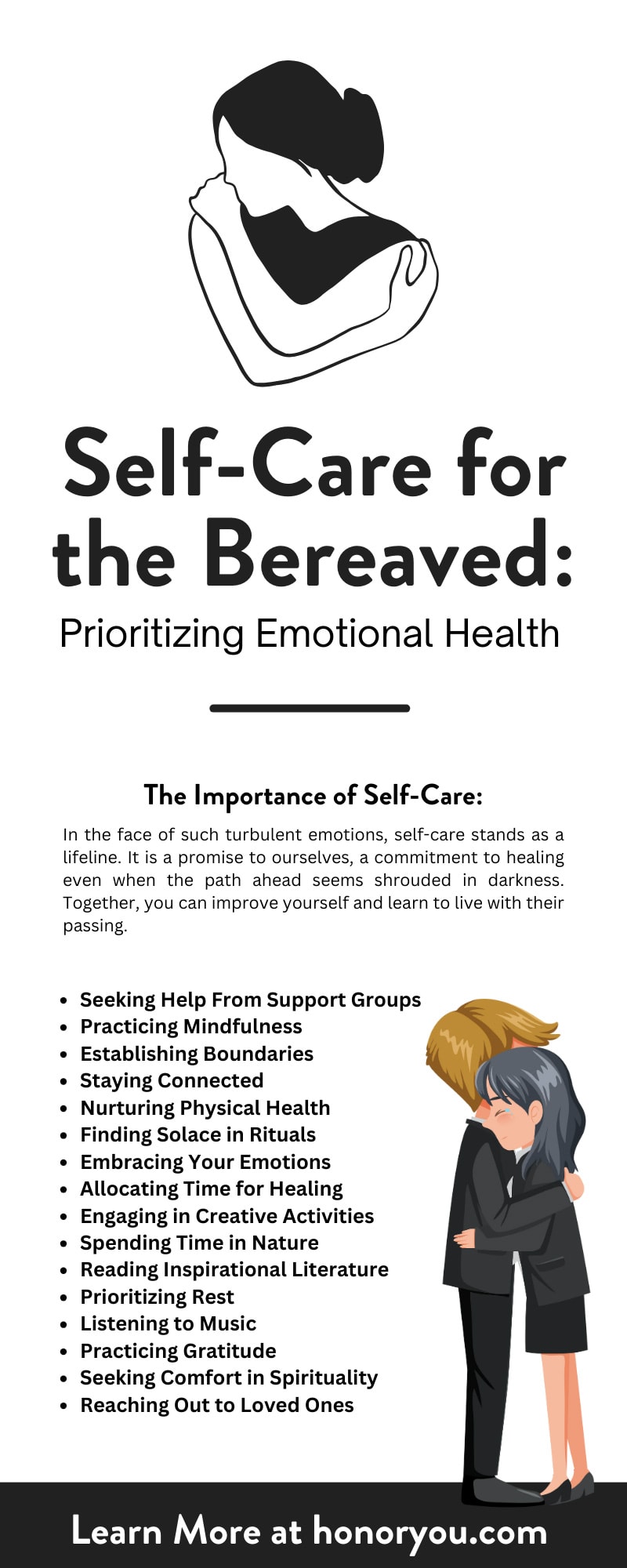Self-Care for the Bereaved: Prioritizing Emotional Health

A Practical Guide for Preparing for Passing On
September 14, 2023
Words of Comfort To Share at a Funeral Service
September 22, 2023Embarking on the journey of grief, we often find ourselves standing at the edge of an abyss, staring into a landscape darkened by loss, and surrounded by profound silence. The emotional journey can feel like a solitary voyage, teeming with intense sadness and longing. In these moments of overwhelming grief, the need for self-care becomes an essential part of our healing process. This guide on self-care for the bereaved provides solace and support, illuminating the significance of prioritizing emotional health while grieving.
Understanding Bereavement:
Grief is a personal experience that leaves a permanent mark on our lives. It triggers a storm of emotions—intense sadness, anger, guilt, and sometimes, a numbing sense of disbelief. The physical manifestations are equally varied, from sleep disturbances to changes in appetite or a weakened immune system. Mentally, it often presents as difficulty concentrating, intrusive thoughts about the departed loved one, or a sense of disconnection from reality. Recognizing these reactions as part of the grief process is the first step toward understanding and navigating this difficult journey.
The Importance of Self-Care:
In the face of such turbulent emotions, self-care stands as a lifeline. It is a promise to ourselves, a commitment to healing even when the path ahead seems shrouded in darkness. Explore the different sections below to learn how to heal yourself and deal with the pain of losing your loved one. Together, you can improve yourself and learn to live with their passing.
Seeking Help From Support Groups
The office of a therapist or counselor can act as a sanctuary for expressing emotions and navigating grief. Trained professionals can help guide individuals through their grief journey, offering valuable insights and coping mechanisms.
Practicing Mindfulness
Practice mindfulness by being fully present in the moment and acknowledging feelings without judgment, as this can be a powerful tool during grief. It allows individuals to honor their feelings of loss while creating space for moments of peace or joy.
Establishing Boundaries
During this sensitive time, protecting emotional energy by setting boundaries is crucial. If certain conversations or situations feel too painful, it is necessary to communicate the need for space to those around you.
Staying Connected
While solitude can bring healing, prolonged isolation can intensify feelings of grief. Connecting with supportive friends and family members who respect boundaries can help create a compassionate support network.
Nurturing Physical Health
Physical health shares an intrinsic link with emotional and mental well-being. Ensuring a balanced diet, performing regular physical activity, and maintaining a sleep routine can significantly support overall well-being.
Finding Solace in Rituals
Rituals provide comfort and continuity amidst the chaos of grief. Whether lighting a candle in memory of a loved one each morning or visiting their resting place on specific days, routine practices can provide peace and connection.
Embracing Your Emotions
It is important to allow oneself to feel and express the emotions knitted in the fabric of grief. Bottling up emotions can lead to increased stress and anxiety. Grief is a powerful, heavy emotion that needs to be expressed. Embrace these emotions through writing in a journal, painting, or talking to a trusted friend.
Allocating Time for Healing
In the realm of grief, the passage of time takes on a different rhythm. The minutes might feel like hours, and the hours can stretch into days that seem to extend into infinity. Remember that this is a moment to recognize that healing from grief isn’t a race; it’s a journey that unfolds at its own pace.
Engaging in Creative Activities
Grief can be a welcoming invitation to pursue creative activities. Immersing oneself in creative projects is a powerful therapeutic tool for self-care. It doesn’t matter whether you consider yourself an artist or not. The goal is not to create a masterpiece through your emotions and thoughts. Drawing, painting, writing poetry, or even cooking a special meal can become a healing outlet for your feelings. Remember, it does not have to be perfect; it just must be yours.
Spending Time in Nature
Nature has a unique way of soothing our souls. Spending time outdoors, whether going for a walk in the park, sitting by a lake, or observing birds in your backyard, can calm you and ensure you’re better connected.
Reading Inspirational Literature
Sometimes, books contain words we cannot express when exploring grief. Whether it’s the first time or not, trying to grapple with grief is an indescribable experience everyone faces, but the words expressed in books may provide the right comfort. Spiritual text, a self-help book, or a novel could resonate with reality. Stories often draw a fresh perspective on passing on that we might not have considered before. Unravel yourself in inspirational literature to find solace and connect with others.
Prioritizing Rest
Times of grief mean restless nights. These intense emotions can impact our sleep patterns, so it’s essential to prioritize rest. Ensure you give yourself time to relax and catch up on missed sleep, even if it means taking a quick nap during the day.
Listening to Music
Music has a powerful way of reaching our emotions. Listening to calming music, your loved one’s favorite songs, or tracks you associate with happy memories can be a comforting self-care practice.
Practicing Gratitude
Even in grief, there can be moments of joy, love, and gratitude. Keeping a gratitude journal where you jot down little things you are thankful for each day can help shift focus from pain to appreciation, fostering healing in the process.
Seeking Comfort in Spirituality
If you find comfort in spirituality or religion, lean into those beliefs during your grief journey. Prayer, meditation, attending religious services, or reading spiritual texts can bring peace and purpose to your life.
Reaching Out to Loved Ones
Do not hesitate to reach out to loved ones and share your feelings. Speaking about your loved one who has passed away, sharing memories, or simply talking about your day can help you feel connected and supported.
The journey of bereavement is indeed a challenging one. However, it is crucial to remember that no one walks this path alone. Prioritizing self-care during grieving is not an act of selfishness; it is an act of self-preservation. With these self-care practices, individuals can navigate the path of grief with resilience and hope. And always remember, it is OK to ask for help and grieve in one’s own way and pace.
Amid learning about self-care strategies to help navigate the bereavement journey, consider adding personalized funeral items to reach for when you need comfort. Honor You wants to keep the memory of your loved one burning for years to come. Every step forward, no matter how small, is a testament to strength and resilience.



